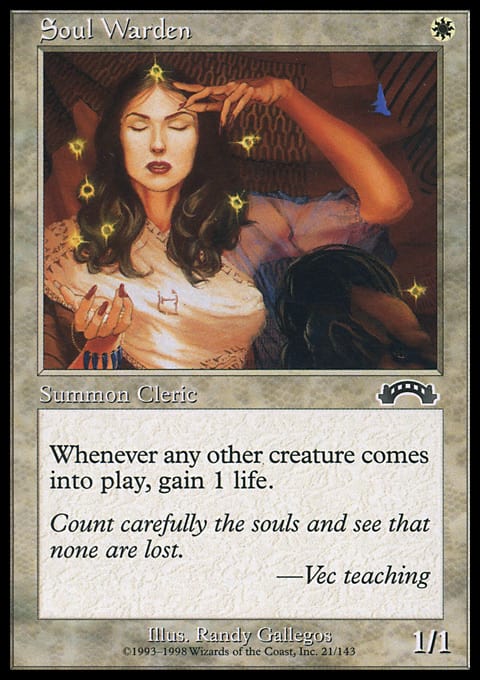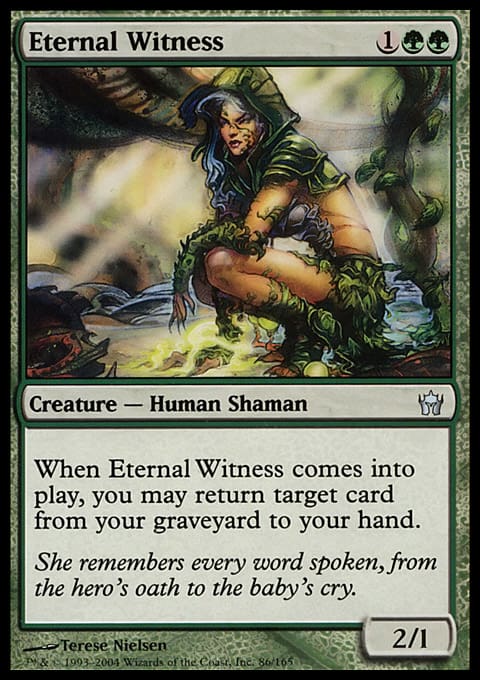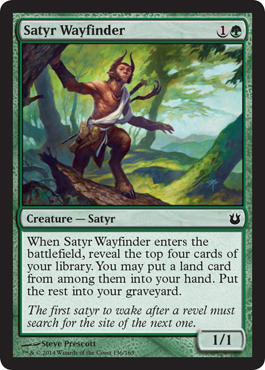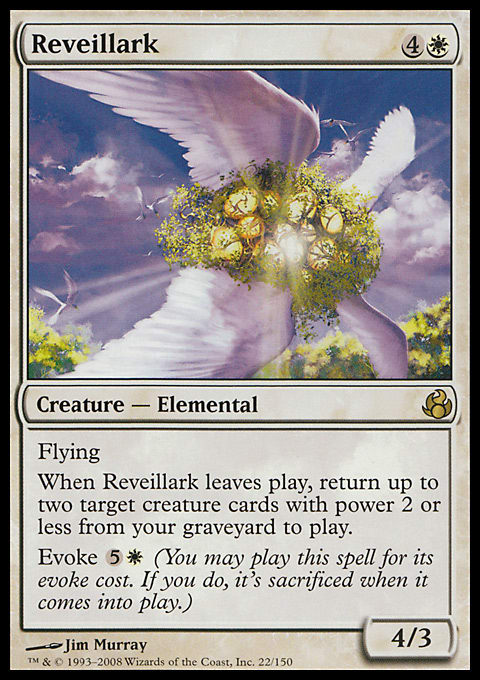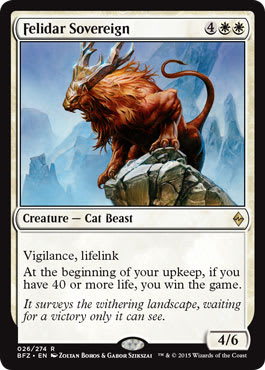In this experiment, though things are eerie, we witness a ranger find his way with the attendance of a guide.
Duel Decks: Blessed vs. Cursed is coming, and that means a few previews for Shadows over Innistrad have arrived. One interesting cards among these previews is the heavily discounted, fifty-percent-off version of Sudden Disappearance.
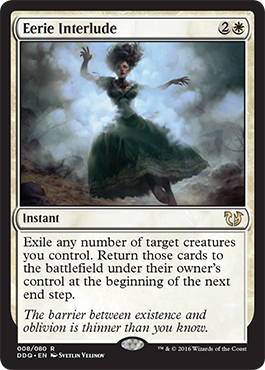
Of course, it has the important distinction that Eerie Interlude can only exile our own creatures, while the Disappearance can clear out a bunch of blockers (or a Platinum Angel that’s keeping us from winning the game in another way). But if we’re comboing off with something, it’s probably our own creatures, so being able to have access to this effect for only 3 mana (and at instant speed instead of sorcery!) is pretty exciting.
The question, then, is what we’re going to do with the effect. It has a few applications. Since it’s an instant, we can use it to have our creatures dodge removal spells, including mass removal like Wrath of God. Also, we can use the Interlude to keep our creatures alive through combat, such as by blocking and then exiling so our blockers don’t die. We could even use the spell to permanently exile our token creatures, in case we have more Saprolings than we know what to do with, or to kill ourselves with Phage the Untouchable.
But the obvious and most exciting use, I think, is to reuse enters-the-battlefield triggers of our creatures.
Reentering the Battlefield
When looking for creatures with enters-the-battlefield triggers, two things guided my decisions. You see, there are a lot of creatures with enters-the-battlefield triggers in Magic: The Gathering. But since Eerie Interlude is both white and inexpensive, I decided to stick with those two themes. But the more powerful the ability, the more expensive the creature, and low-cost creatures tend to have weaker or more situational abilities. What I ended up going with is a low-impact, but very scalable, ability on an inexpensive creature.
Soul Warden — Here is the classic life-gain creature. It isn’t super-high-impact when it first enters, but as it sticks around, it can gain us a lot of life over time.
Soul's Attendant — With this one, you don’t have to gain the life if you don’t want to. That’s generous.
Essence Warden — Okay, yeah, there are three, and this color-shifted version from Planar Chaos brings green into the mix. I don’t mind adding green to our color suite for reasons that will soon become obvious.
Eternal Witness — There might be a stronger enters-the-battlefield trigger in the game on some expensive creature or another, but it’s hard to beat picking up any card out of our graveyard for only 3 mana. This also forms the heart of our combo, which is not just casting and resolving Eerie Interlude, but then having Eternal Witness reenter the battlefield to put the Interlude back into our hand so we can cast it again and do it all over again.
Karmic Guide — Okay, so this gives Eternal Witness some competition for the best enters-the-battlefield ability. Not only can we bring a card back from our graveyard, but we can put it directly into play. Of course, our selection has to be a creature in this case, but that’s not all bad. We are paying 4 instead of 3 here, and the Guide has an echo cost, meaning we’ll have to pay 4 again in our next upkeep if we don’t want it to die, but overall, it’s worthwhile. There’s even more downside since, when we cast Eerie Interlude, we’ll have to deal with the echo again, but we could also cast the Interlude with echo on the stack to get around having to pay for a turn (while bringing back another creature!). And if we have Eternal Witness around, we can pretty much cast Eerie Interlude as frequently as we can pay ![]()
![]() .
.
Ranger of Eos — So, so far, we’ve just been banking on gaining a bunch of life with our Soul Wardens and friends while repeatedly casting (and staying alive with) Eerie Interlude. We haven’t demonstrated any particularly powerful cards in terms of their impact on the board state, which means our cards aren’t actually doing much to help us win the game. And since a bunch of our cards are 1/1s for 1, we’ll be running out of cards in hand pretty quickly. Ideally, we’ll have plenty of cards in play, and we’ll always have Eerie Interlude in our hand, but we still might want a bit of actual card advantage, and Ranger of Eos can provide that while also finding us more Soul Wardens.
Satyr Wayfinder — Karmic Guide doesn’t do us any good if we don’t have creatures in our graveyard to return. Sure, a 1/1 might die, but that’s not a particularly exciting choice for what to bring back. With Wayfinder leaving and entering the battlefield repeatedly, we should keep plenty of Karmic fuel in addition to land drops to keep our resources accelerating.
Everything Else
Reveillark — Perhaps this belongs in the previous section—it essentially triggers whenever we cast Eerie Interlude, though it doesn’t actually have an enters-the-battlefield trigger. Instead, whenever Reveillark leaves the battlefield, we can return two of our creatures from our graveyard to the battlefield. We just can’t choose Ranger of Eos or the creature we’ll be covering shortly.
Felidar Sovereign — Okay, fine, I guess we can play a win condition. And though this costs 6, we never actually have to pay for it if things are going according to plan. Just Interlude frequently, gaining a ton of life from Soul Wardens and returning the Interlude with Eternal Witness. Cast a Karmic Guide at some point, which can then return the Felidar Sovereign. And if we cast the Interlude during our opponent’s turn (which is probably the best time outside of dealing with Karmic Guide), the Sovereign will be in play during our upkeep, and we’ll win the game.
Also, it’s probably worth noting the amounts of life we can gain with, say, three Soul Wardens around when Interluding. Those three will gain us 2 each (from the other two creatures), and if we happen to have any other creature around, that 6 life becomes 9. With Ranger of Eos finding more copies of Soul Warden, Soul's Attendant, and Essence Warden (every time he enters the battlefield!), this life-gain will scale up dramatically and quickly.
Also consider how many times we can Interlude per turn cycle. Since the creatures don’t come back until the next end step, it will rarely be correct to cast Eerie Interlude during an end step—as that means waiting through a whole turn before the creatures come back. Rather, with 6 mana, maybe cast Eerie Interlude during our own upkeep to avoid echo (we’re not attacking anyway) and then at some point during our opponent’s attack phase to handle blocking first (but before combat damage). Things like avoiding instant-speed removal and finding time to cast a Karmic Guide could switch that up a bit, but that Interlude schedule is probably ideal.
Interlude of the Soul ? Casual | Andrew Wilson
- Creatures (32)
- 2 Felidar Sovereign
- 2 Reveillark
- 4 Essence Warden
- 4 Eternal Witness
- 4 Karmic Guide
- 4 Ranger of Eos
- 4 Satyr Wayfinder
- 4 Soul Warden
- 4 Soul's Attendant
- Spells (4)
- 4 Eerie Interlude
- Lands (24)
- 4 Forest
- 4 Plains
- 4 Secluded Steppe
- 4 Sunpetal Grove
- 4 Temple Garden
- 4 Tranquil Thicket
Some other cards that came up in my searches are Kitchen Finks, Leyline of Vitality, Inquisitor Exarch (as another option for a win condition), and Aven Riftwatcher. I thought the twelve 1-drops and their synergy with Ranger of Eos were pretty attractive, but the idea is versatile.
So if you like frustrating your opponents, if you previous list suddenly disappeared, or if you just need an interlude, give this deck a try.
Andrew Wilson
fissionessence at hotmail dot com
















